Google’s search engine is a flexible and highly customizable tool.
And yet I’m still amazed to find digital marketing professionals who are just unaware of some of the most powerful and essential search techniques.
Being able to use just a handful of Google’s most common search operators can open up a whole new dimension in search specificity, allowing you to hone in your results and filter out millions of irrelevant web pages.
Add in additional functionality like time dependent search, Google Alerts and a couple of straightforward URL hacks and you’ve effectively got yourself an upgraded search engine.
Table of Contents
Search Operators
There are a lot of search operators you can use in Google search and an even larger number of ways in which you can combine them to create pin point accurate searches.
Below are four that you simply cannot do without.
1. Quotation Marks
Quotation marks (” “) force Google to only return results that match the exact phrase or term entered.
This is perhaps the most widely known operator, probably because it’s almost certainly the most useful operator you can know.
Essential when trying to search for specific terms or quotes.

2. The Minus Operator
The minus (-) operator allows you to discount certain terms or phrases from your searches.
This is extremely useful if you’re searching for something that often gets confused with something else.
The minus operator can also be used in conjunction with other operators to open up a whole new level of precision search.
Despite showing images for the Terminator films in the example below, using the minus operator has produced organic web search results that aren’t in fact referring to the films.

3. Site:
The site: operator allows you to specify a URL to hone your search down to a specific site.
This is an extremely powerful way of searching a large site, or a subdomain on that site, for specific terms and words.
Combined with the minus (-) operator it can become an incredibly powerful way of searching the web for any references to a website, whilst discounting all the internal results from the site itself.

4. Intitle:
The intitle: operator allows you to interrogate the web for words and terms that only appear in a document or webpage’s title.
This is a very powerful way of targeting your search especially when used with quotation marks.
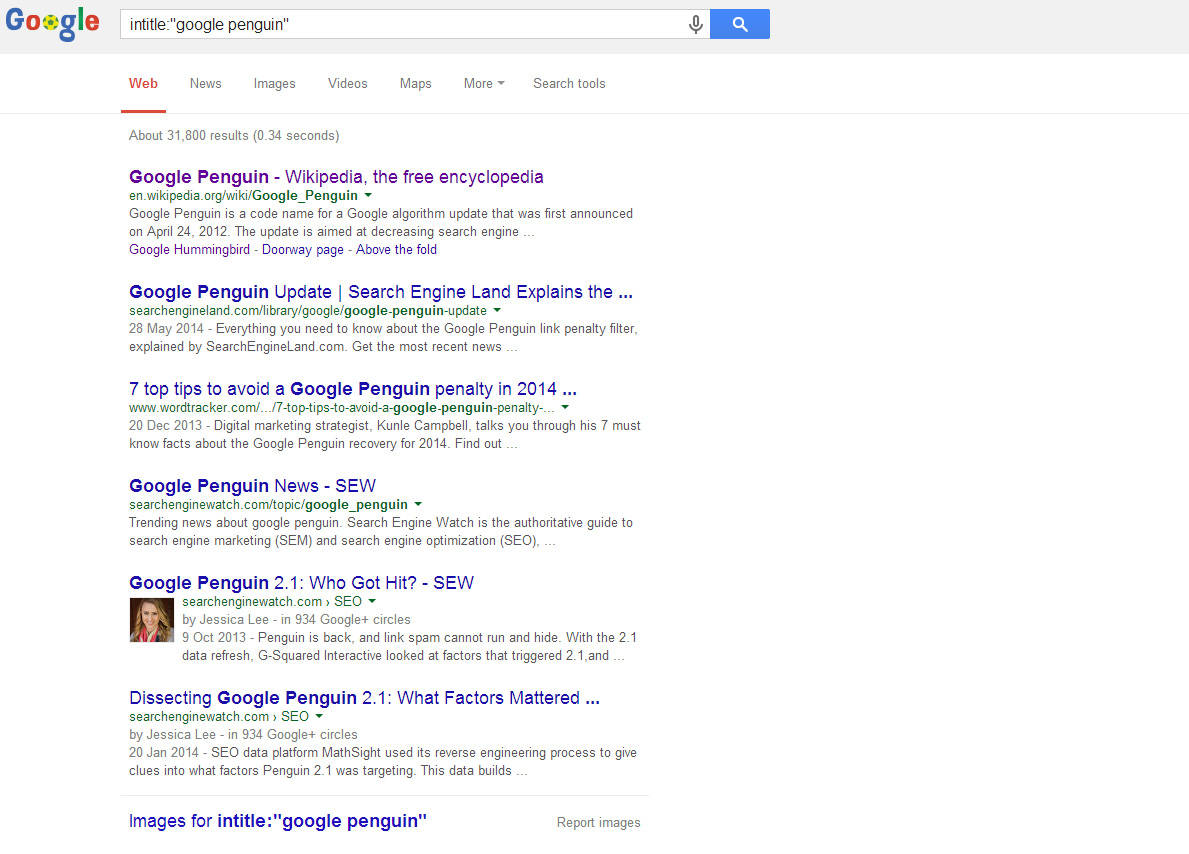
Other Search Functionality
The power Google has to refine search results doesn’t just stop with the use of operators.
The search engine has some useful and all too often overlooked features that could end up making your life a lot easier, if only you knew they existed.
From time dependent search to alerts, here are four of our favourites.
5. Time Dependent Search Results
It might seem like an obvious one, but a lot of people forget the time filter in Google’s search engine, which is hidden away under the ‘search tools’ tab, which also drops down to reveal a whole raft of other filters.
The time filter allows you to search for webpages that have been indexed anywhere from the last year to the last 24 hours.
You can also specify a custom range in here, which enables you to search for articles that were written about a certain event or news story in the days, weeks or months after it occurred.
There may be occasions when you want to tailor your results to only show web pages that have been indexed mere hours, minutes or even seconds ago.
This could be to find articles that are literally ‘hot off the press’ for example.
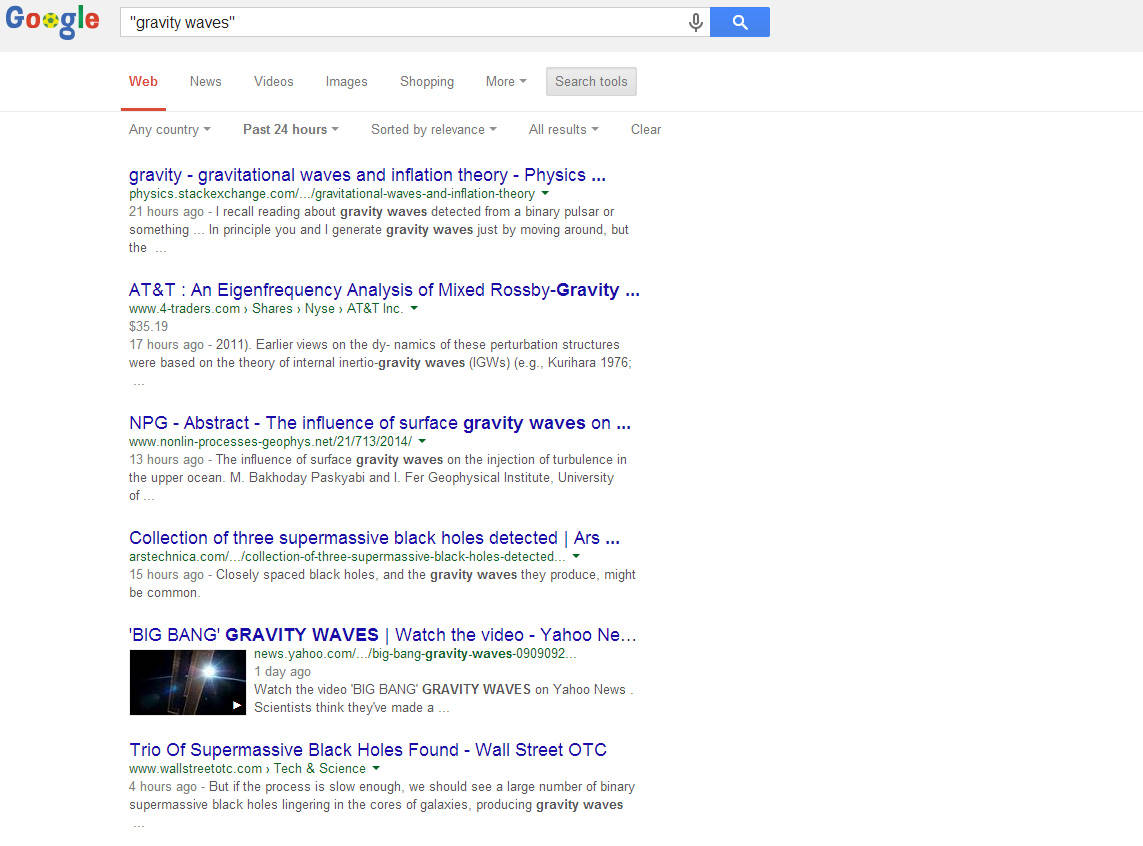
Just enter the following hack at the end of the URL in the address bar for the specific Google search engine results page with a unit of time and number as defined below.
&tbs=qdr:n5 – will only show webpages cached in the last five minutes
&tbs=qdr:s5 – will only show webpages cached in the last five seconds
6. Displaying Publication Dates of Web Pages
This URL hack is one of my favourites and extremely useful.
Whilst publication dates are shown for some results in the SERPs, you’ll always find a lot of results that don’t display them.
We’ve all been searching for articles on a subject before only clicking through to one that looks really relevant only to find it’s seven or eight years old and totally irrelevant now.
Worse still, many sites don’t even bother to display publication date, leaving you to skim read the article or browse the first comments to try and approximate when it was first published.
By adding this bit of code to the end of the URL in Google’s search engine results page you can see the first date every page was cached by Google next to each result.
This is extremely powerful if used in conjunction with the site: operator as you can immediately see which is the most relevant article on any given subject within a given website.
7. Google Reverse Image Search
Google’s reverse image search never fails to amaze as it effectively allows you to search for images by typing in image URLs or even uploading images from your own hard drive into Google’s search engine.
This is an often overlooked feature of web search, partly because the technology is still in its infancy and partly because it’s not always obvious what to use it for.
From an SEO’s perspective I think one of the most useful ways of using this feature is to search for images of people’s profile images.
This is a quick way of clarifying authorship for a particular article or social media profile as fake profiles will often use random photos from the internet and you’ll quickly find the source of the image this way.
Check out this Lifehacker article for many more tips on harnessing the power of Google’s reverse image search.
8. Google Alerts
Last but certainly not least are Google Alerts.
This feature could well become outdated in the near future with the wave of powerful new social and keyword tracking tools hitting the market such as Social Mention and Mention.
What Google Alerts allow you to do is effectively monitor the web for mentions of a given set of keywords or keyphrases and inform you with regular emails.
The frequency of these emails can be set to once a day or once a week.
Alternatively you can have Google Alerts email you on an ‘as-it-happens’ basis.
You can apply various filters to your alerts including region, language and result type (news, blogs, video, etc).
Search operators can also be used here when defining your search.










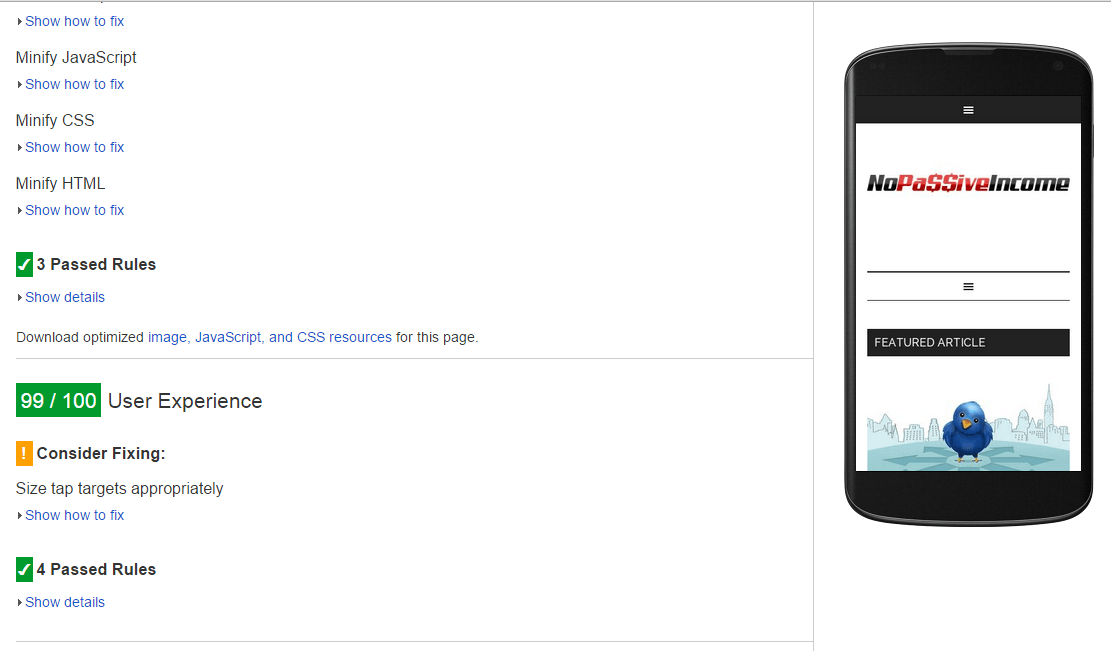






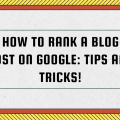

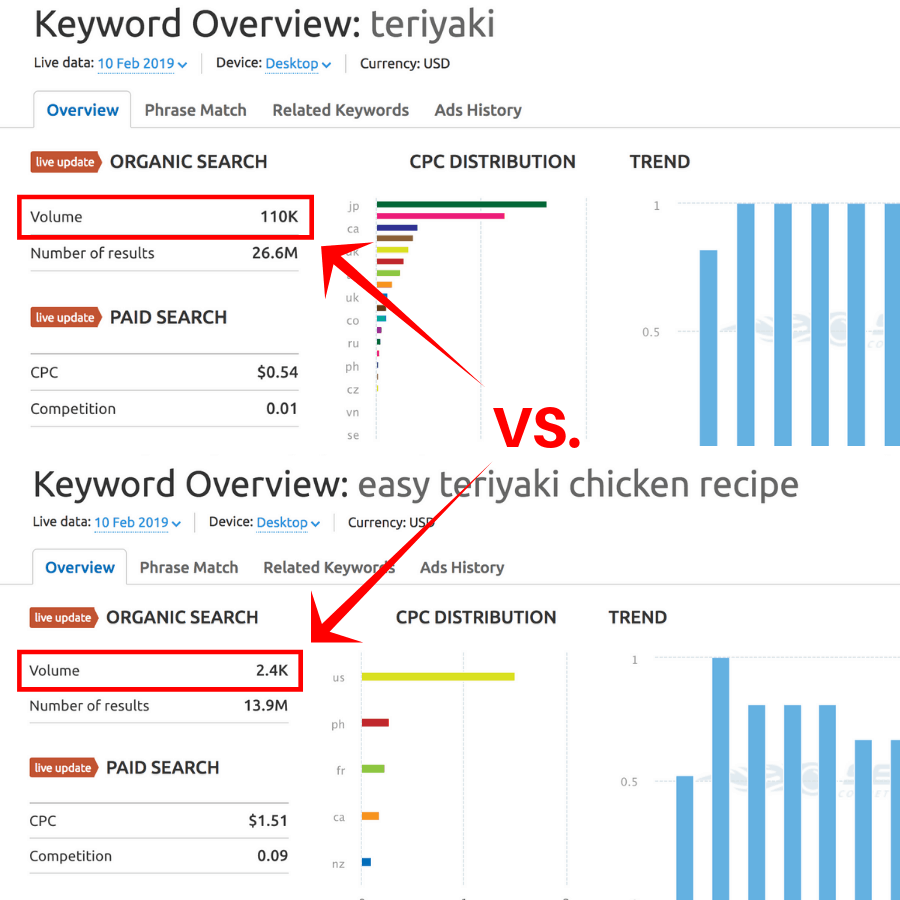


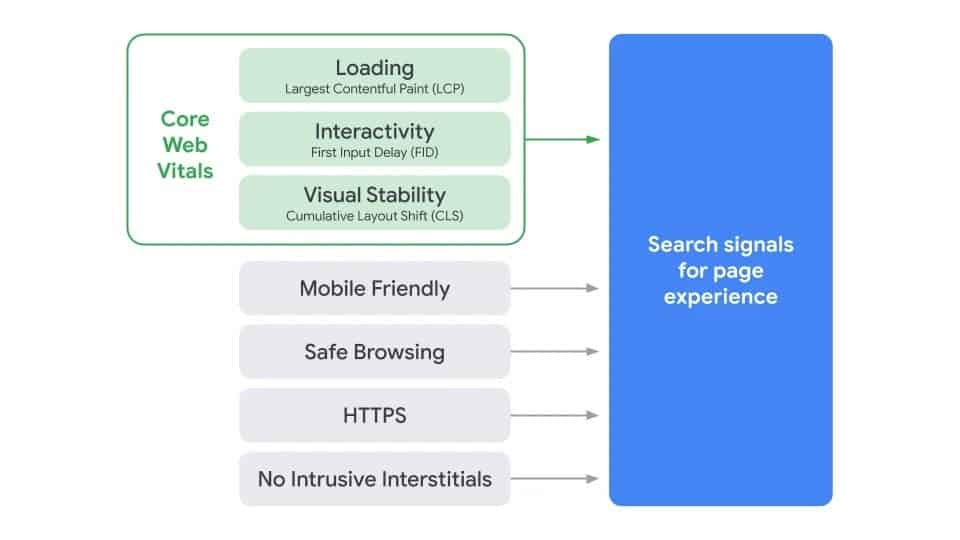


Hey Joe,
Excellent write man. I didn’t know about the search using time but hey, good stuffs!
Something that I seriously overused is the Google Alert. Very useful when you are trying to get the latest ‘trends’ on Google.
Thanks for sharing!
~Reginald
Thanks Reginald. The publication dates one is really handy actually. So useful if you are searching for very time dependent articles and don’t want to waste time reading stuff that’s 3 or 4 years old. Google Alerts also very useful but is slowly being superseded by brand monitoring tools like Mention.
Always great to remind people about those Joe. People usually neglect them even if they read about it but when I teach them even just basic search parameters or even just “showing” them how to select the timeframe? It blows them away. LOL. 🙂
Cheers, Dennis. It’s amazing how many people don’t know about these, even the quotation marks. This operator alone can make such a difference to how effectively you use Google to search the web.
Wonderful and useful post, Yes Obviously search operators are a much useful technique to get desired results in search engines. I have some insight about the all the things you shared except Google Reverse Image search as I am not aware of this . I am glad that I learned a new tips through your blog. Thanks for the piece of info.
Glad you liked it Vino. Another popular reverse image search engine is Tin Eye, so if Google is giving you any issues try this one instead. https://www.tineye.com/
Hi Joe,
This is a great keeper. While I knew some of those tricks, I certainly learned many more like the reverse images search. I’ve never used that before, but sounds interesting.
I use quotes and intile at times, but never heard of time dependent search. That’s pretty cool.
I will definitely bookmark this post for future reference, as I’m sure I won’t remember them all.
Great post.
Thanks Sylviane. Glad it helped. The reverse image search still kinda freaks me out. Who would have imagined ten years ago that you could search for an image in Google and get back instances of the exact image all over the net. Really handy for spotting fake user profiles.
Hi Joe,
Thanks for sharing these information… 🙂
There are many other types of search queries like:
cache:www.YourDomain.com
allintext:keyword
allintitle:keyword
allinanchor:keyword
allinurl: Your Keyword/Phrases
And many more…. 🙂
Regards…
Hi Karmakar,
There are indeed quite a number of operators, but we wanted to limit the article to cover 8 methods so we didn’t have room to put them all in. I’ve tried to cover the best ones.
For a more comprehensive list, have a look at the article we put up on the Bespoke Digital website. http://www.bespoke-digital.co.uk/seo-tools/google-search-operators/
Hi Joe,
Thanks for the link… I will check that ASAP… 🙂
@ Erik,
I am glad that you think I was able to add some value to this discussion… 🙂
BTW: Have you seen your BroadedNet traffic analysis on my blog?
Regards…
Hi Joe,
Thanks for sharing some great points for Google Search Queries. Find some most of the queries new and hope these will help me to improve search experience.
Hey Erik and Joe,
Thanks for writing this.
I know a few of these search techniques.
I have learnt alot from reading this article.
Thanks
Hello Erik,
Its been a long time since the last time I visited your blog and I must say lots of things changed at your blog = New design and etc.
And these google search tips are quite impressive.
Hi Joe and Erik,
The reverse image search is so cool. I found a few months back that someone was using my image on a dating site, and that same someone was running a scam. Not good. I was free of any wrongdoing but it was still a bad move on his part, and I know folks who noted this to me probably used the reverse image search to nail this guy down.
Amazing, what you can find through Google.
I plan to reverse image search a few of my travel photos. So much potential out there for networking if we see where our links, images and where our brand is popping up persistently, as many times we’re not tagged or RTed or shared with a mention.
Many times folks give us props without noting us, including through image use, so the feature is a smart brand tracker for any blogger.
I feel my Fiji travel images may be circulating out there. Time to make some friends. Reverse search activating.
Thanks so much Joe. Tweeting this through Triberr.
Have a fun weekend guys.
Ryan
Hello, Joe and Erik,
I couldn’t agree more! 🙂 It’s very flexible and customizable.
It doesn’t surprise me one bit the digital marketing professionals are unaware of these essential search techniques– I just published a video post on my site where I listed seven tips for making your blog more powerful, and many people are not implementing even the most basic functions on their site. I suppose ignorance is bliss.
Love using quotation marks, have been using this technique for years, and when I learned about it, a light bulb went on, and it saved me so much time. 🙂
Thanks for the reminder to use the minus operator more. I tend to forget to use it when I should. Love the site and in title operators, and have used this with success on Topsy too.
Oh, now I didn’t know about the time dependent search results, that’s cool. I knew they existed but didn’t have any of the code and haven’t used them yet. Thank you!
Really like reverse image search – super cool and useful.
Thanks for all the great tips, I appreciate it.
Sharing with my friends.
– Carol 🙂
Steal deal I guess, All these tips are very awesome. Just checked all of them and they are working like charm.
Thanks
Hi Erik,
Google has great search operators and I use them to improve my work efficiency. I had a similar post on this topic which has a long list of Google search operators. Check the link on my name for the same. Hope it would be useful for the our readers. 🙂
Hey Erik,
You’ll be very proud of me that I knew about ALL of these except the minus symbol.
Just this morning I was searching for a solution to a problem I was having and it kept bringing up content that had nothing to do with what I was wanting to know. It was an issue with a widget and it kept giving me results about plugins. Two totally different things and I never asked about plugins. Another reason I’m always disappointed with the search engines these days.
Now back when I was doing a lot of article marketing and searching for keywords, titles, etc. I had learned about a lot of these types of searches so at least I’m not totally ignorant of this. Yay me!
Great share and thanks for explaining this because I am definitely using the minus one. Wish I had read this post this weekend and it would have saved me some time this morning. LOL!!!
Enjoy your week.
~Adrienne
Hi Erik
Quotes, minus sign, site, initiate and alerts options I have been using for quite a long time but rest of the others in your awesome post I never tried but now seriously thinking to avail them to refine my online searching to a professional level.
All the online professionals must make their every effort very focused and least time consuming to bring more results. For this purpose your post is complete solution of making our Google search more accurate to the way we want to use it.
Thanks a lot for sharing this wonderful post of great value.
Wonderful and useful post, Yes Obviously search operators are a much useful technique to get desired results in search engines. I have some insight about the all the things you shared except Google Reverse Image search as I am not aware of this . I am glad that I learned a new tips through your blog. Thanks for the piece of info.
Not finding what you need on #Google ? Here are some things you can do to refine your searches.
The more specific you can be with your Google search the better. A lot of people are lazy and don’t put much thought into their searches. For example if you are looking for a local company include your location in the search. That might sound simple advice but the number of times I see the location missed off searches that are obviously for local services is huge.
Great tips! I personally always set my search settings for something that has been published in the last few years at least, so I get more relevant and up to date information.